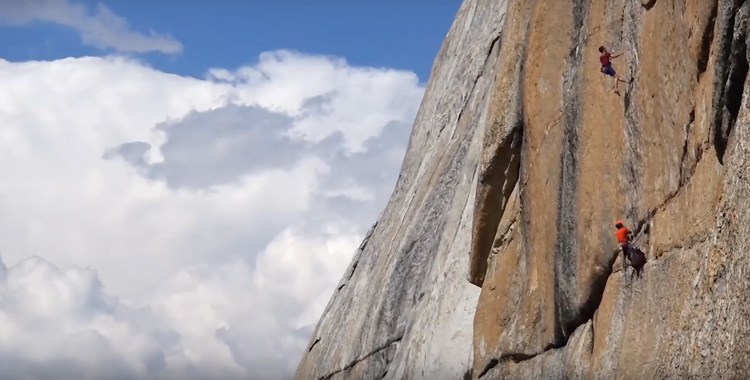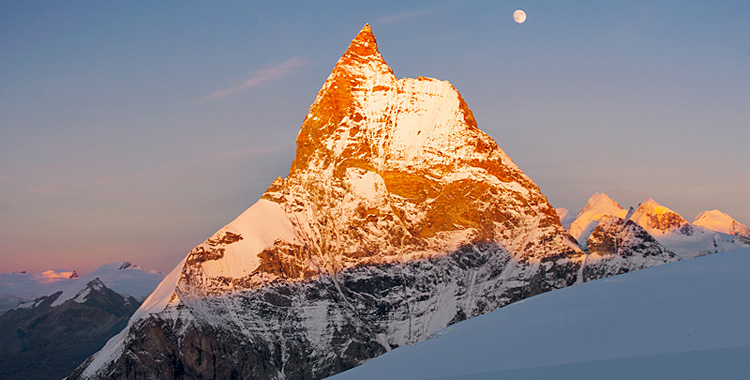The following is written as a counter-argument to ideas expressed in a video about a life that’s committed to climbing.
https://www.youtube.com/watch?v=3KT8VgfApLE
I present it simply as a counter-argument. I’m not saying I’m right; I just want to express a worry or unease that I have with Nate’s argument. Because I think its underlying premisses need to be looked at critically.
My first point is that the whole argument falls at the very first fence with the notion of ‘commitment’ – hallowed here as something that in itself is morally wonderful. But a commitment to what? One can, for example, commit to a project or way of life that is morally reprehensible.
So, the mere fact that it involves ‘commitment’ per se cannot be where its real value lies.
Instead we find that it’s: a commitment to contributing nothing to the world, giving nothing to the world. Doing nothing to try to improve the world. Taking away with a huge carbon footprint.
In other words, it’s pure self-indulgence.
It may be something of a cliché, but it’s an important one: life is about giving as well as taking. Surely?
So much of life is a question of balance; indeed one could say that the whole of life is a balancing act. Between oneself and others, or rather, between oneself and society. The society to which one belongs and to which one contributes.
I’m not at all ashamed to say that I’m old-fashioned enough to believe in a work ethic.
The climbing lark that’s promoted here seems to have little to do with natural values, much to do with artificial goals. In fact, all the goals are reduced simply to numbers: ‘I sent my first 8B. … My first E7.’
Always about ever higher numbers (‘Every goal I had was exceeded.’)
But there was a downside. He tells us there were medical problems: finger injuries, tendonitis, and so on. As if we’re meant to feel sympathy. (It’s amazing how little the most talented climbers do actually injure themselves. Most as a result of accidents, very little to do with obsessional over-exercise.)
And he suffered other ‘hardships’. Apparently, while he was on his quest for ever higher numbers, he lost his grandparents … Gosh, life’s tough.
But it was all worth it because it was set against ‘a backdrop of well-spent time.’
But that is the question: is it really time well spent, except in a purely self-indulgent sense?
Then he thinks of another benefit. ‘You will get to know incredible people.’ But many activities and careers do that. Some of the finest people I’ve ever met have been in occupations as divergent as film technicians, actors and … social workers.
Future goals? ‘I want to try to climb harder on sport … ‘
‘I want’.
I have always seen climbing as something that complements ordinary life and work. Something that work makes possible. It’s of huge personal value in how it helps you cope with ordinary life. But I do not believe it should become an end in itself.
But the argument presented here is that climbing itself is enough to give meaning to life; it doesn’t require anything else. (Relationships, by the way, are never mentioned.)
It’s a simple philosophy, behind which lie two unstated beliefs:
That the purpose of life is to climb rocks or mountains.
Is it?
And all that really matters in life is that one enjoys oneself.
Is it really?
The above triggered a huge debate on UKClimbing.com/forums/rocktalk. I added this comment:
I think it’s been a useful debate and I’m sorry if I seemed a little harsh. I certainly did not want to denigrate anybody. As I say, it is a critical debate that I’ve had with myself as a climber (and several people on this forum have noted that). In time I’ll add some further thoughts, or some kind of further explanation of what I meant, in my blog. For the moment, can I simply say what I really like about your well-crafted video: that you are very focussed, as you say a doer rather than a dreamer – that you have really extended yourself, found you are capable of climbing better than you ever realised, and that you’ve inspired huge numbers of other people. Right at the centre of ‘the meaning of life’ (hope this doesn’t sound too pompous) has to be the whole business of having dreams and turning them into realities. And this you have most certainly done.
Further note. Most of the people who’ve criticised me on UKClimbing have missed my main point, which is really about the subtext of Nate’s article that work is typically something ‘shitty’ per se, and that ordinary life is inferior to ‘a climbing life’. I have always seen them as entirely complementary, as part of a whole picture in which climbing is integrated into ordinary life and not something completely opposed to and separate from it. I’ll be writing about this more fully soon – particularly about my attitude to ‘work’.



Very well put Gordon. I agree with your counter argument completely.
Firstly – thanks for putting ideas out. I like general dialogue – although yours does seem a little judgmental. That said, you did say they were quick thoughts – so here are some quick thoughts in reply.
> My first point is that the whole argument falls at the very first fence with the notion of ‘commitment’ – hallowed here as something that in itself is morally wonderful. But a commitment to what? One can, for example, commit to a project or way of life that is morally reprehensible.
I don’t claim committing to something is morally wonderful. This video is more just to share factual events that happened when I did commit fully to climbing – the results were pretty wonderful.
> So, the mere fact that it involves ‘commitment’ per se cannot be where its real value lies.
> Instead we find that it’s: a commitment to contributing nothing to the world, giving nothing to the world. Doing nothing to try to improve the world. Taking away with a huge carbon footprint.
> In other words, it’s pure self-indulgence.
My videos have been viewed for 100 million minutes. Contribution?
I pay tax every year. Contribution?
I manufacture a product in the USA and distribute it all over the world.. Contribution? I wrote a book which has sold well and continue to help people create their own projects. Contribution?
On top of that in the past I have designed, patented and sold a medical product, developed dialysis machines, employed teams of people in the UK, Malaysia and the Philippines, lobbied the UK Govt on Prison Reform, created a few businesses of varying success and worked in a corporate managing international product design and mfg.
Your snap judgements seem to betray someone who *wants* to read a narrative in younger people which fits in with a daily-mail style denigration of millennials.
FYI: I offset my annual carbon footprint x4 through the excellent solaraid charity.
And, honesty, if I want to indulge myself I will.
Looking at your CV – mostly in media production (sort of what I do now) it is hard to see how our current ‘contributions’ are any different. By writing off my massive viewership it seems to do the same for you.
If people reading, enjoying or learning from your books are a contribution – and it takes 10 hours to read one, then you would have to have sold about 166,000 to match my viewership.
> It may be something of a cliché, but it’s an important one: life is about giving as well as taking. Surely?
> So much of life is a question of balance; indeed one could say that the whole of life is a balancing act. Between oneself and others, or rather, between oneself and society. The society to which one belongs and to which one contributes.
>I’m not at all ashamed to say that I’m old-fashioned enough to believe in a work ethic.
Probably a cursory glance at my youtube channel would give you an idea that I may have a work ethic. Probably one which would compete fairly well with yours. I know a whole heap of people who work very hard but also have the sense to f**k off and have a good time too.
> The climbing lark that’s promoted here seems to have little to do with natural values, much to do with artificial goals. In fact, all the goals are reduced simply to numbers: ’I sent my first 8B. … My first E7.’
> Always about ever higher numbers (‘Every goal I had was exceeded.’)
Numbers are an easy way to communicate improvement. I am sure you will know that in each progression in climbing there is a lot of learning, on big routes probaby some drama and struggle. In a video that sums up 3 years – with the aim to deliver a simple message; you can probably do more than you imagine.. I am not going to spend an extra hour talking about nuances and detail. As someone who creates film this should be fairly easy to understand.
> But there was a downside. He tells us there were medical problems: finger injuries, tendonitis, and so on. As if we’re meant to feel sympathy. (It’s amazing how little the most talented climbers do actually injure themselves. Most as a result of accidents, very little to do with obsessional over-exercise.)
> And he suffered other ‘hardships’. Apparently, while he was on his quest for ever higher numbers, he lost his grandparents … Gosh, life’s tough.
I know a few talented climbers who have injured themselves – mostly from trying hard. I one day wish I can get injured with obsessional over-exercise – I just don’t train much – perhaps I should.
Actually I included the shit bits because typically today we only see the gloss – personally I like to show a more accurate picture.
> But it was all worth it because it was set against ’a backdrop of well-spent time.’
> But that is the question: is it really time well-spent, except in a purely self-indulgent sense?
It was well spent time, very well spent time.
> Then he thinks of another benefit. ’You will get to know incredible people.’ But many activities and careers do that. Some of the finest people I’ve ever met have been in occupations as wide as the film technicians, actors and … social workers.
Good for you I did not say you wouldn’t meet amazing people in real life – but some jobs tend to be fairly limited in the number of new people you meet.
As I travel I meet about 10 times more new people than when I worked and lived in a city. This is a real benefit of this lifestyle.
> Future goals? ’I want to try to climb harder on sport … ‘
> ‘I want’.
> I have always seen climbing as something that complements ordinary life and work. Something that work makes possible. It’s of huge personal value in how it helps you cope with ordinary life. But I do not believe it should become an end in itself.
Well I make a living from doing what I do now and it is amazing.
How to value your ‘work’? Can you measure your impact on society? Perhaps you can provide testimonials about how you have positively impacted people’s lives?
By trying to value one type of contribution (yours) over another (mine) is pretty tricky and I might be able to compete if we were to work out some form of metric.. and I have only just got started on this little vein of work.
> But the argument presented here is that climbing itself is enough to give meaning to life; it doesn’t require anything else. (Relationships, by the way, are never mentioned.)
> It’s a simple philosophy, behind which lie two unstated beliefs:
> That the purpose of life is to climb rocks or mountains.
Is it?
> And all that really matters in life is that one enjoys oneself.
Is it really?
Relationships are mentioned.
Not sure I recall suggesting that climbing is enough to give meaning in life. It is just that I decided to swap my prioritisation of work > climbing for a while.
Hope this helps see the general motivations behind this video and also to see that perhaps most younger people work for the stuff they do.
Best,
Nate
Thanks, Nate, for your very long and considered reply. As I say, I was wanting a debate – which is exactly what you’ve done. If I seem judgemental, I’m also being judgemental about myself, because I spent 40 years climbing actively and sometimes I would question myself about what it all amounted to. I.e. it’s a vague concern I’ve had for many years.
On the other side of the argument, though, I wished to express the amount of satisfaction, joy etc. I get out of work itself. I’ve never seen it as before ‘for’ something beyond itself, except for its contribution to other people’s lives. I.e I think it has its own intrinsic value.
I remember particularly when someone once asked Stanley Kubrick – a genius I was fortunate enough to work with – ‘Don’t you ever want to have a holiday, Stanley? Go to a nice beach in the Caribbean?’ – he just said ‘Why?’ The way he said it was just superb.
Climbing is a deep and broad sport with many cross-applicable areas of personal development. I have learned a lot from climbing that helps me with other areas of my life.
Work is not necessarily bad, I like working. I will probably never stop doing things – I tend to do projects – rather than work. It takes away the feeling that success is only measured financially and gives room for creating or doing things that are not seated in pure economic value.
I would not worry about the time you spent climbing not doing something else. It is good time – usually spent with friends – building strong connections – trying hard, learning about yourself… opposed to what we imagine about ourself. It’s all good.
Not one for beach holidays either 😛